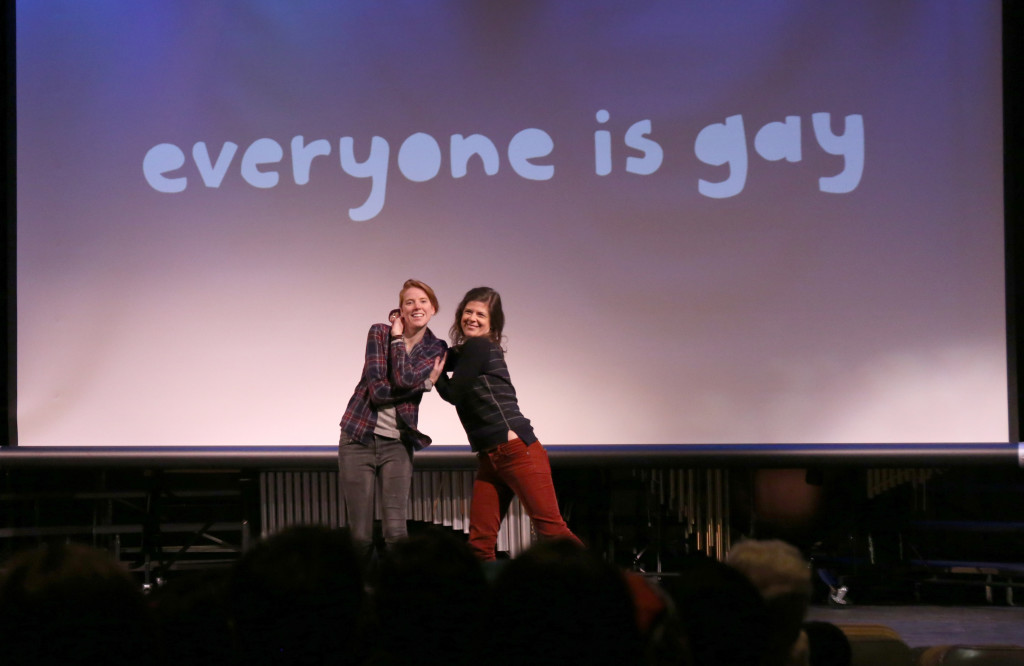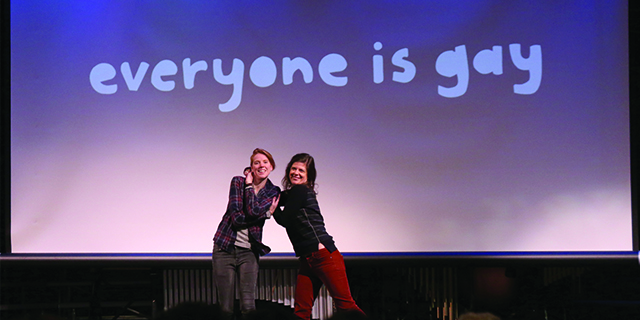
According to co-founders Dannielle Owens-Reid and Kristin Russo, “Everyone is Gay” is not your average, everyday website. Similarly, the highly anticipated annual Queer Straight Alliance Club Assembly, which took place on Thursday, January 7th, was definitely not your average assembly.
To begin the assembly, Charlotte Blackman (V), Lilly Sterenberg (V) and Roma Murphy (V) took the stage to educate the school on why the club transitioned from being the Gay Straight Alliance to the Queer Straight Alliance. The overarching principle behind this shift is inclusiveness. Charlotte explained that “queer is an umbrella term for everything that is not straight or cisgendered.”
Another goal of the assembly was to educate the student body on how to be an ally. Lilly listed four ways to be an ally: “Understand your privilege, listen and do your homework, speak up but not over, and ally is a verb.” Calling yourself an ally is not enough, she said.
Mr. Anhalt, faculty advisor of the QSA, and Diversity Coordinator Randy Slaughter elaborated on the privileges that come with certain identities. Mr. Anhalt, though silenced and excluded during his youth as a gay male, also recognized that “I have my own identities that I carry around with me every day.” It took him a long time to recognize his own privileges as a cisgendered, white, able-bodied man. In terms of ally-ship, Mr. Anhalt encouraged an “active effort to be respectful of others.”
Cordelia Bellinson (IV) wittily answered the “FAQs of Gender,” with the context of “sex is physical and gender is a social construct.” When answering questions about LGBTQ+ pronouns, she made the argument that “you don’t have to memorize all of the pronouns—just ask — it’s like asking someone their name when you first meet them.”
Cordelia was followed by a heartfelt and hilarious speech by Noah Parnes (IV), in which he came out as gay to the Upper School community.
“People aren’t surprised if at least one student comes out on stage every year,” Parnes said. “What does it mean that people expect it and why did I expect that I would be doing it?”
Noah described his journey to coming out on stage. He was inspired by the stories of other students in years past, such as Dena Miller (VI) who came out her freshman year.
Guest speakers Reid and Russo came up to speak next. Reid and Russo began by performing a choreographed dance to “Boom Boom Pow” by the Black Eyed Peas. It was clear from their presentation that humor is a part of everything that the duo does. Reid founded “Lesbianswholooklikejustinbeiber.com,” in the spirit of humor, yet received some negative feedback from the LGBTQ+ community on the basis that she was stereotyping lesbians.
Reid met Russo, a gender studies major, and they decided to start an advice website. On the site, Reid explained, you can ask questions anonymously about anything from “falling in love with your best friend to coming out to your parents.”
Now, five years since beginning Everyone is Gay, the duo has two new projects: a book called “This is a Book for Parents of Gay Kids,” meant to answer all of the overwhelming and burdening questions that parents might have when their kid comes out, and “The Parents Project,” a major project for the parents of LGBTQ+ kids with 40+ writers involved.
Quincy Confoy (V) moderated a conversation with Reid and Russo about many of the topics that members of the QSA club had previously brought up, such as labels, pronouns, and coming out.
“When do you think, if ever, that labels are necessary or not?” Quincy asked.
Reid replied that, “people find labels to create community and not feel alone.” Explaining the negative nature of labels, Russo said that sometimes when one chooses a label they believe their behavior must correspond accordingly with the associated stereotypes.
“Labels aren’t meant to be policed and [used to] push each other away,” Russo said. “The reason that the acronym exists is to bring a community together that feels the same thing.”
With regards to ally-ship, a major part of Reid and Russo’s work with the “Everyone is Gay” movement, Russo addressed the Upper School by asking the students to use their skills.
“As you continue forward in your life,” she said, “always think of how you can use your skills to be an ally.”






